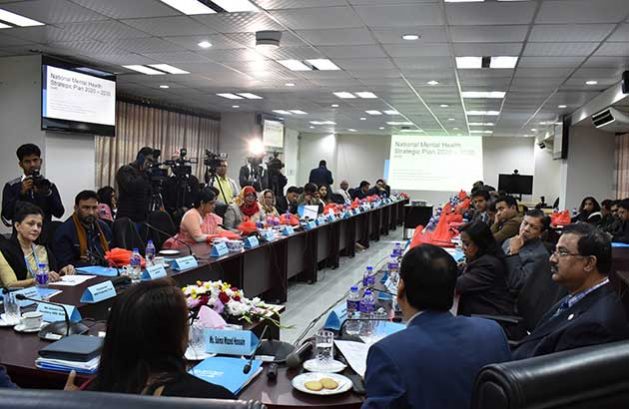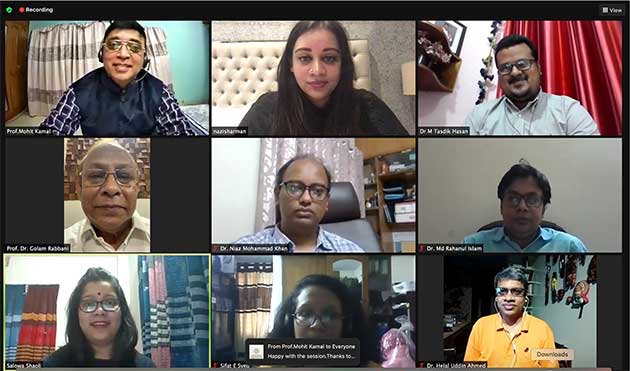Mental Health Strategic Plan for Bangladesh: An Overview

DHAKA, Bangladesh, Oct 28 (IPS) - Mental health and treating mental health conditions involves not only treating an individual’s ability to manage their thoughts, emotions, behaviors, and interactions with others, but also ensuring that the social, cultural, economic, political, and environmental conditions are in place through effective national policies, social protections, adequate living standards, working conditions, community social support, and a tiered system of care through a robust network of health services. In Bangladesh, the Mental Health Act 2018 and the National Mental Health Policy 2021 were developed with the above in mind.
The Act and the Policy have also directed the development of the National Mental Health Strategic Plan for the country. The Strategic Plan document has been developed at the request of the Ministry of Health and Family Welfare’s Department of Non-Communicable Diseases. This document has been prepared with funding from the Department for International Development, and technical support from the World Health Organization’s Regional Office for South-East Asia and the Shuchona Foundation. It is envisaged that the strategic plan will allow the incorporation of required priorities of the Government within the broader framework of the policy including appropriate resource allocation with an effective monitoring and evaluation mechanism.
The National Mental Health Strategy 2020-2030 embarks to establish a comprehensive, inter-sectorial, integrated, and responsive system to ensure access to and utilization of quality mental health and psychosocial wellbeing services and information. The mission of the strategic plan is to establish a sustainable, rights based, holistic, inclusive, multi-sectoral framework. This will ensure provision of information and quality services for promoting mental health and psychosocial wellbeing, prevention, treatment, as well as rehabilitation of mental health conditions throughout the life course of the people of Bangladesh.
The strategy development process included a series of reviews of program evaluation reports, literature search, evidence, strategy, and policy documents by consultants, focus group discussions with relevant professional societies, ministries and division, semi-structured interviews with experts, technical group meetings, field visits and stakeholder consultative workshops for consensus building on critical issues and finalization. The core values and principles in the strategic plan are guided by the National Mental Health Policy 2021 (currently pending final approval), the Mental Health Act 2018 and several global plans and charters including the WHO Comprehensive Mental Health Action Plan 2013-2020, UN Principles for the Protection of Persons with Mental Illness and the Improvement of Mental Health Care, the Rights of Persons with Disabilities which have been ratified by the Government of Bangladesh.

Four general objectives have been envisioned in this strategic plan which are derived from the ‘WHO Comprehensive Mental Health Action Plan 2013 – 2020’:
- To strengthen effective leadership and governance for mental health.
- To provide comprehensive, integrated, and responsive mental health and social care services in community-based settings.
- To implement strategies for promotion and prevention in mental health.
- To strengthen information systems, evidence, and research for mental health.
The Strategic Plan has been organized in a manner such that, there is a breakdown of specific objectives indicated against each of the General Objectives of WHO’s Mental Health Action Plan 2013-2020, along with global and Bangladesh’s country specific indicators and targets. The mental health strategic plan also outlines Core Responsibility, Collaborative Partners, Advised Activities, Resources, Output Indicators and Funding Allocation for each of the specific objectives.
The Strategic Plan also highlights the different factors across the lifespan that are associated with mental health and provides an overview on how they are linked. There is consistent evidence worldwide that there is a link between mental health and physical health and in fact, one can easily say that they coexist since many of the risk factors of poor physical health are also risk factors for poor mental health. The key factors highlighted in the Strategic Plan include noncommunicable diseases, poverty, nutrition, violence, childhood and adolescence, humanitarian crisis, substance abuse and suicide, amongst others.
In conclusion, it is clear that an effective strategy for mental health, requires a multi-sectoral approach with specific considerations for the needs of vulnerable groups of the population. In order for such a plan to be implementable, sustainable and relevant, it is imperative that stakeholders, especially those with lived experience, provide important insight from their point of view. The goal of the current plan, once approved, is to ensure that not only those living with mental health conditions receive timely and effective treatment, but that the treatment approaches are not further stigmatizing, harmful and threaten their basic human needs and rights. It is hoped that the strategy which has been developed can be easily implemented and will result in a plan of action that will enable greater understanding of mental health in the community and enable greater psychosocial well-being for the people of Bangladesh.
Saima Wazed, a licensed School Psychologist, is currently Clinical Instructor for the Department of School Psychology at Barry University. Additionally, she is Advisor to the Director General of WHO on Autism and Mental Health, Member of WHO’s Expert Advisory Panel on Mental Health, Chairperson of the National Advisory Committee on Autism and NDDs in Bangladesh, Thematic Ambassador for “Vulnerability” of the Climate Vulnerable Forum, and Chairperson of Shuchona Foundation. Nazish Arman is Lead Content Developer of Shuchona Foundation.
Shuchona Foundation is a non-profit organization focusing on advocacy, research, and capacity-building, specialising in neurodevelopmental disabilities, and mental health. It aims to construct an effective bridge between national and international researchers, policy makers, service providers, persons with NDDs and their families, to promote inclusion nationally, regionally, and globally. The Foundation is a member of the UN ESCAP Working Group on disability as of May 2018, and holds special consultative status with UN ECOSOC since 2019.
Shuchona Foundation was the member of the Working Group on the National Mental Health Strategic Plan; and Saima Wazed was its Chief Advisor.
© Inter Press Service (2021) — All Rights Reserved. Original source: Inter Press Service

